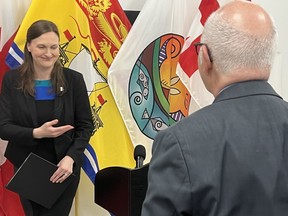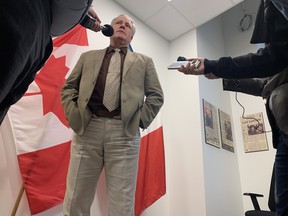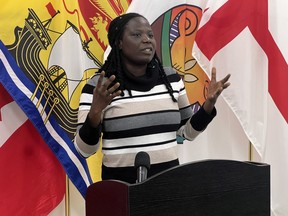Green environment bill goes too far, says interim Tory leader
May 26, 2025
Greens lobby other politicians to support the right to fight for a clean environment, but Official Opposition leader isn’t convinced

New Brunswick’s two Green opposition MLAs are pushing hard for a new law they say would make it easier for citizens to seek investigations into environmental pollution.
Advertisement 2
Story continues below
Article content
But the leader of the Official Opposition remains unconvinced.
On Monday, Green party Leader David Coon and Deputy Leader Megan Mitton held a news conference in Fredericton to outline why they hope the governing Liberals and Official Opposition Progressive Conservatives support the private member’s bill, An Act Respecting the Right to a Healthy Environment, in a free vote this Thursday.
A similar bill sponsored by the Greens in December 2023 under the former Higgs Tory regime died before second reading.
This time, Premier Susan Holt has promised that her Liberal caucus will vote freely on the issue and not by party line. Interim Tory leader Glen Savoie, head of the Official Opposition, said he’d also allow his party’s MLAs to take a free, unwhipped vote, even if he personally does not like the bill.
Advertisement 3
Story continues below
Article content

“There’s no doubt that our history had demonstrated repeatedly that the traditional approaches to environmental legislation have not worked sufficiently to protect New Brunswickers’ health, particularly the health of children, and to maintain nature’s balance,” Coon said, as representatives of organizations who support the legislation listened.
“It’s time that we supplement those traditional approaches to environmental legislation and law with legislation that provides and entrenches a substantive right to a healthy environment and provides the procedural rights to citizens to uphold that substantive right.”
Ontario is the model for the bill, which enacted similar legislation some 30 years ago under Bob Rae’s NDP government, a law that has been respected by successive Liberal and Tory administrations.
Article content
Advertisement 4
Story continues below
Article content
Quebec and the three territories have followed suit with their own legislation that combines human rights law with environmental law to, in the words of the Greens, “empower citizens with procedural tools they can use to defend their right to a healthy environment.”
Practically speaking, Coon told reporters New Brunswickers would have benefited from the law if it had been on the books years ago, citing several examples, such as the contamination of an aquifer in Newcastle near a mill that dumped poisonous wood preservatives; the pollution in Belledune from heavy metals from a lead smelter; and the sullying of people’s gardens and yards in West Saint John after a huge fire at a metal scrapyard rained ash far and wide.
Advertisement 5
Story continues below
Article content
In each case, Coon argued, ordinary citizens didn’t have enough power to protect themselves and demand changes.
The bill obliges the provincial government to make environmental information more readily available and establish a rights registry.
It would also create a new independent officer of the legislature, like the child and youth advocate or the auditor general, to respond to public concerns and investigate environmental complaints.
The Greens say the proposed law would also give the public better access to the courts. It would allow an ordinary citizen to bring an environmental protection action against the provincial government for failing to enforce existing laws.
Lastly, the new law would protect employees from reprisals from their employer if they blew the whistle on the contravention of environmental regulations. It would also shield ordinary citizens from firms that use strategic lawsuits against public participation (often called a SLAPP), aimed at stopping them from speaking out against industrial pollution.
Advertisement 6
Story continues below
Article content
Savoie said he was not keen on the Green bill, arguing its powers went too far.
“David Coon has never once spoken to me about it, and neither has Megan Mitton,” the interim Tory leader said. “What this bill proposes to do goes far beyond what any of those other jurisdictions have in place. I agree with the spirit and intent of the legislation, but it’s poorly written and needs to go back to the drawing table.”

East Coast Environmental Law helped draft the legislation. One of its lawyers, Richelle Martin, told the audience at the news conference that the other provinces and territories with environmental rights laws have encouraged more people to push for cleanups, such as oil spills at gas stations.
“We see that members of the public are using this request to investigate,” she said. “And in places where we don’t have the right, like in New Brunswick, we see individuals who may reach out to government departments and have issues investigated but not have success and not have any other legal tools to address those issues.”
Advertisement 7
Story continues below
Article content
Other groups in favour of the legislation include NB Lung and the New Brunswick Medical Society, representing more than 2,000 practising, future, and retired physicians in the province.
Hara Saadia, a researcher with the New Brunswick Environmental Network, wrote her university thesis on natural resource development and how it had affected people’s health.
She said based on the interviews and conversations she’s had with people in places like northeastern New Brunswick, it was clear the legislation was needed.

Mitton has been working behind the scenes to convince lawmakers to vote in favour of the bill and acknowledged some of them had misgivings that it would simply replicate the Clean Air Act and Clean Water Act. However, she argued those concerns were misplaced.
Advertisement 8
Story continues below
Article content
She said it would make sense for MLAs to vote in favour of sending the legislation to the law amendments committee where they could suggest changes to strengthen it. Such a committee would hear from witnesses for or against the bill, likely in September.
The deputy leader encouraged New Brunswickers to contact their MLA and push them to vote in favour of the bill.
But Savoie said he wouldn’t vote in favour of the bill because amendments are only supposed to be used to tweak legislation, not completely overhaul it.
“There are limitations to amendments. An amendment cannot gut a bill. So, if it takes away from the intent of the bill, the amendment is not allowed.”
Article content
Search
RECENT PRESS RELEASES
Related Post




Join the conversation